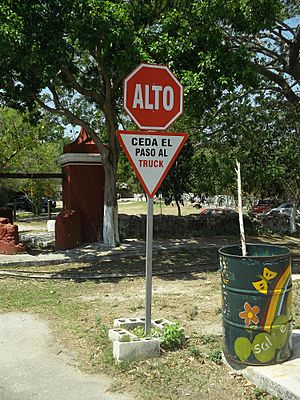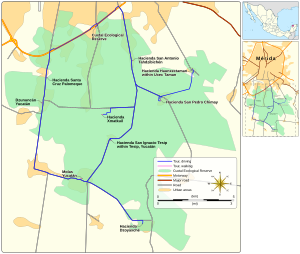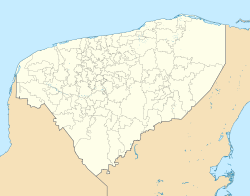Hacienda San Nicolás Dzoyaxché facts for kids
Quick facts for kids
Hacienda San Nicolás Dzoyaxché
|
|
|---|---|
|
Private Event Venue
|
|

Entrance Hacienda San Nicolás Dzoyaxché, Yucatán.
|
|
 |
|
| Country | Mexico |
| Mexican States | Yucatán |
| Municipalities | Mérida Municipality |
| Time zone | UTC−6 (CST) |
| • Summer (DST) | UTC−5 (CDT) |
| Postal code |
97316
|
| Area code | 999 |
The Hacienda San Nicolás Dzoyaxché is a historic property in Yucatán, Mexico. It's also known simply as Dzoyaxché. This hacienda was built during a time when a plant called henequen was very important for making ropes and other products. Today, it's part of the Cuxtal Ecological Reserve. This reserve was created in 1993 to protect both the natural environment and the old buildings around the city of Mérida.
Contents
What's in a Name?
The name "San Nicolás Dzoyaxché" is a mix of Spanish and Maya words. "San Nicolás" is Spanish for Saint Nicholas, who is the patron saint of the chapel on the property. "Dzoyaxché" comes from the Mayan language. It combines "dzo" (meaning "row") and "yaxché" (meaning "ceiba tree"). So, the name means "a row of sacred trees."
Getting There
This historic hacienda is located about 27 kilometers (about 17 miles) south of Mérida. You can find it on Calle 42.
A Look at History
The chapel at Hacienda San Nicolás Dzoyaxché was built in 1926. Every year, from September 10th to 20th, a special celebration (fiesta) is held there to honor the patron saint. Inside the chapel, you can see a beautiful marble carving made by an Italian artist in 1888.
In 1952, Francisco Martínez de Arredondo y Castro owned the hacienda. After he passed away, his wife, Josefina Molina Vda. de Martínez de Arredondo, inherited it. Later, in 1962, she sold a part of the hacienda.
The Cuxtal Ecological Reserve
On June 28, 1993, the Cuxtal Ecological Reserve was officially created. Its main goal is to protect the history and nature of the area. This reserve includes seven large haciendas, their nearby villages, and several smaller archaeological sites. It also protects six natural sinkholes called cenotes and an important water supply station for Mérida. Hacienda San Nicolás Dzoyaxché is a key part of this special reserve.
Within the reserve, these other haciendas are also protected:
- Hacienda Hunxectamán
- Hacienda San Antonio Tahdzibichén
- Hacienda San Ignacio Tesip
- Hacienda San Nicolás Dzoyaxché
- Hacienda San Pedro Chimay
- Hacienda Santa Cruz Palomeque
- Hacienda Xmatkuil
Today, Hacienda San Nicolás Dzoyaxché is a place where people can visit. You can take tours, host private events, go horseback riding, or ride bicycles on special paths. There's also a cenote where you can swim and picnic areas for visitors to enjoy.
Building Style and Features
The Hacienda San Nicolás Dzoyaxché is built in a beautiful colonial style. One of its most interesting features is that the main house is built right over a cenote called Dzonot-Ich. A cenote is a natural pit, or sinkhole, resulting from the collapse of limestone bedrock that exposes groundwater underneath.
You can still see old parts of the hacienda that show how it used to work. There's a 500 mm (19 3⁄4 in) narrow-gauge track where horse-drawn trams used to carry henequen. You can also see the old powerhouse and machines that were used for processing the henequen plant. These are like relics from a time when henequen production was a huge industry here.
Population Changes
Before 1937, many people lived and worked on the henequen plantations. But in 1937, a big land reform happened. President Lazaro Cardenas changed the way land was owned. He turned the large haciendas into collective farms called ejidos. This meant that only a small part of the land (about 150 hectares) was left for the original owners to use as private property.
Because of this change, the population figures before 1937 show how many people lived on the farm itself. After 1937, the numbers show how many people lived in the surrounding community, as only the owner's family lived in the main hacienda house.
According to a census in 2005 by the INEGI, the community had 412 residents. This included 218 men and 194 women.
| Year | 1930 | 1940 | 1950 | 1960 | 1970 | 1980 | 1990 | 1995 | 2000 | 2005 |
|---|---|---|---|---|---|---|---|---|---|---|
| Population | 235 | 183 | 155 | 193 | 246 | 301 | 317 | 361 | 366 | 412 |
Photo gallery
See also
 In Spanish: Dzoyaxché (Mérida) para niños
In Spanish: Dzoyaxché (Mérida) para niños





















